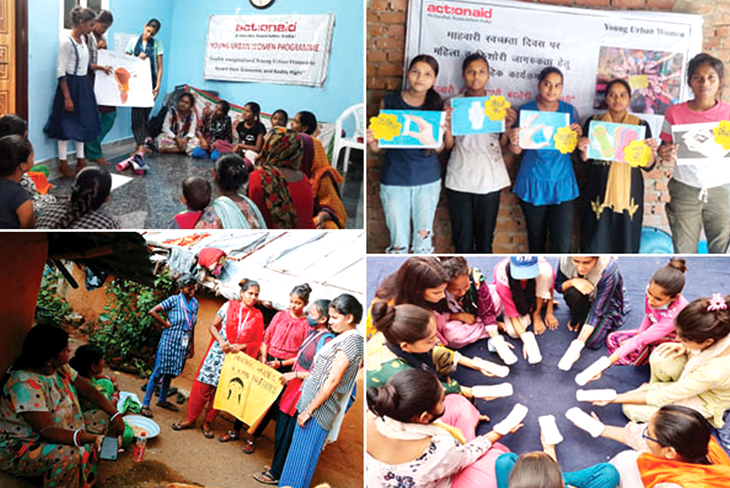In the runup to Menstrual Hygiene Day on May 28, ActionAid Association organised several programmes with women and girls across cities on menstrual hygiene management (MHM). For example, in Lucknow, Uttar Pradesh, during the week preceding Menstrual Hygiene Day, young women and adolescent girls across several slums came together in their respective locations. They talked about their menstruation-related experiences and concerns. Our teams oriented them on correctly using sanitary napkins and on their disposal. We also informed girls about other menstrual products, such as tampons and menstrual cups.
Throughout the week, we conducted workshops, including practical demo sessions, on menstrual hygiene for leaders of young women’s collectives in Hyderabad, Telangana. These leaders trained women and adolescent girls within communities, covering 20 bastis of the city. Young women and girls also learnt about the various ways of dealing with periods. Facilitators introduced them to tampons, menstrual cups and reusable cotton pads. We also discussed the need to involve other stakeholders – including men, boys, teachers and school management committees – in promoting menstrual health and hygiene of women and girls at home, school and in the community.
In Bhubaneswar, Odisha, young women and adolescent girls’ collectives called for an end to the stigma surrounding menstruation. During these meetings facilitated by us and Centre for Child and Women Development (CCWD), we discussed the need to spread awareness about menstruation and promote access to menstrual products. Later, these young women carried out door-to-door sensitisation drives in slum locations. Through these drives, the young women educated and empowered women and girls to manage their menstruation safely, hygienically and without shame.
In Bengaluru, Karnataka, as well, young women observed Menstrual Hygiene Day by organising a discourse on MHM. Muktokantho, a women’s collective in Kolkata, West Bengal, conducted awareness drives on the need to break all taboos and misconceptions surrounding menstruation. They also promoted their recently launched low-cost, eco-friendly sanitary napkin, ‘Feel Free’, in 10 bastis of the city.
In Delhi, we gave adolescent girls the necessary orientation on menstrual health and hygiene. On this occasion, we shared about hand-made cotton pad-making. In Mumbai’s Dharavi, we facilitated a talk for young women by Dr Roma Gupta from Raheja Hospital, Mumbai. She answered women’s queries on menstrual cramps, heavy periods and weakness. She also shared the various calcium, iron and protein-rich foods that women need to include in their diet.
We held a similar session for nearly 50 women from the Rohingya community in Dera Bassi, Punjab, with a local doctor, Dr Ansari. She oriented the participants on menstrual hygiene, health and nutrition. During their two-hour interaction, the doctor helped bust several myths surrounding menstruation and answered women’s queries, including about health issues. Our team also distributed sanitary pad packets to all participants. In Mewat, Haryana, sensitisation sessions were held on May 27-28 across 11 settlements to reach out to women and men from the Rohingya community. Again, our trained team members and volunteers educated the participants on menstrual hygiene and urged them to break the related stigma. More than 200 people participated in these sessions over two days.
A two-hour tweetathon (twitterstorm) on Menstrual Hygiene Day created digital messaging on period-stigma-busting, awareness and facilitating conversations on menstrual health and access to menstrual products.

